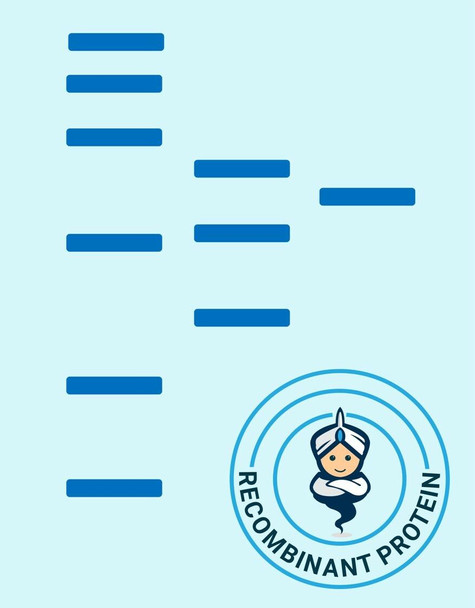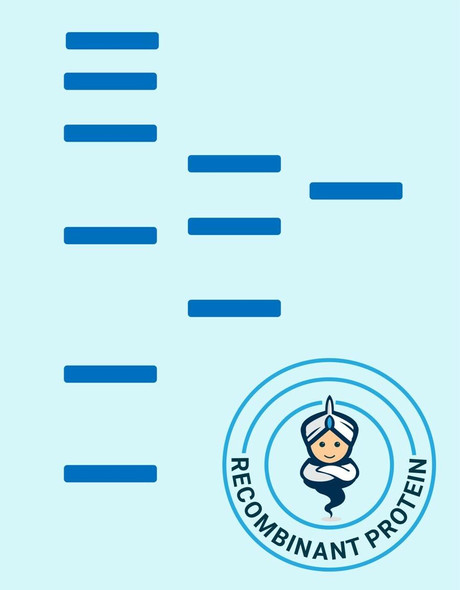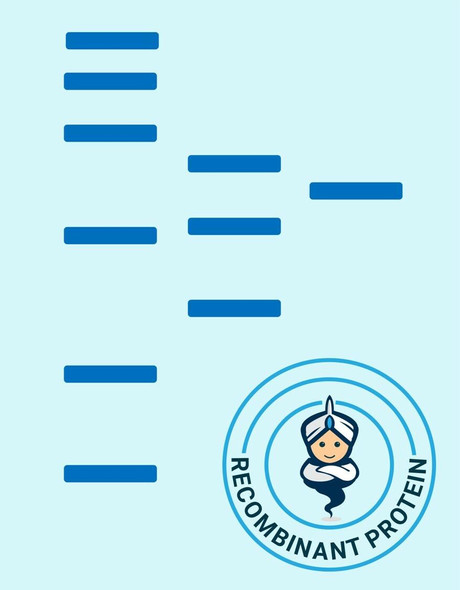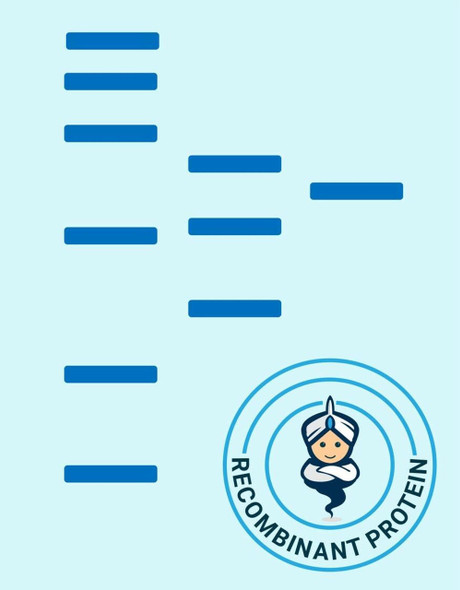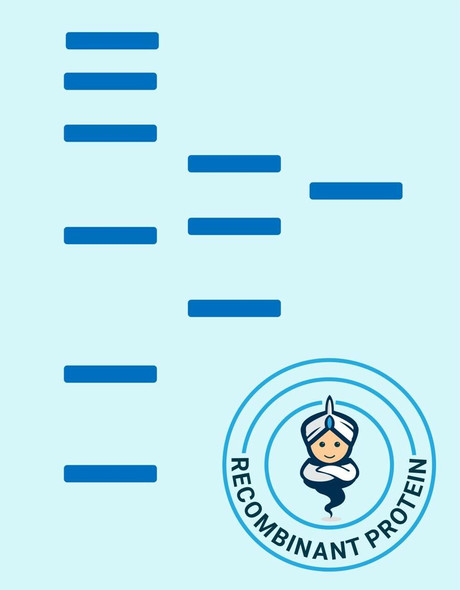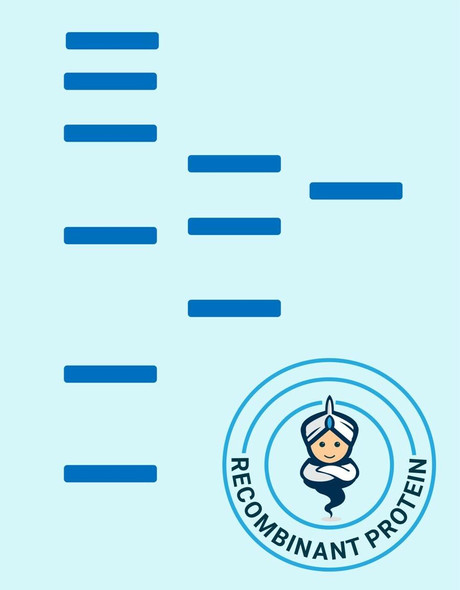Human STARD5 Recombinant Protein (RPPB4842)
- SKU:
- RPPB4842
- Product Type:
- Recombinant Protein
- Species:
- Human
- Uniprot:
- Q9NSY2
Description
| Product Name: | Human STARD5 Recombinant Protein |
| Product Code: | RPPB4842 |
| Size: | 20µg |
| Species: | Human |
| Target: | STARD5 |
| Synonyms: | StAR-Related Lipid Transfer (START) Domain Containing 5,START Domain-Containing Protein 5, StARD5. |
| Source: | Escherichia Coli |
| Physical Appearance: | Sterile Filtered clear solution. |
| Formulation: | STARD5 protein solution (1mg/ml) containing 20mM Tris-HClbuffer (pH8.0), 0.1M NaCl, 1mM DTT and 20% glycerol. |
| Stability: | Store at 4°C if entire vial will be used within 2-4 weeks. Store, frozen at -20°C for longer periods of time.For long term storage it is recommended to add a carrier protein (0.1% HSA or BSA).Please avoid freeze thaw cycles. |
| Purity: | Greaterthan 95.0% as determined by SDS-PAGE. |
| Amino Acid Sequence: | MGSSHHHHHH SSGLVPRGSH MGSMDPALAA QMSEAVAEKM LQYRRDTAGW KICREGNGVS VSWRPSVEFPGNLYRGEGIV YGTLEEVWDC VKPAVGGLRV KWDENVTGFE IIQSITDTLC VSRTSTPSAA MKLISPRDFVDLVLVKRYED GTISSNATHV EHPLCPPKPG FVRGFNHPCG CFCEPLPGEP TKTNLVTFFH TDLSGYLPQNVVDSFFPRSM TRFYANLQKA VKQFHE |
STARD5 is a member of the STARD family of proteins. This family of proteins has 15 different members, all of which hold the distinctive START domain and have a vital part in the metabolism and transport of lipids. The STARD family of proteins has six subfamilies based on their START domain sequences. STARD5 constitute one subfamily, sharing approximately 30% amino acid identity with each other. Even though STARD5 is not sterol-regulated it is induced by endomplasmic reticulum (ER) stress.
STARD5 Human Recombinant produced in E.Coli is a single,non-glycosylated polypeptide chain topological domain containing 236 aminoacids (1-213 a.a) and having a molecular mass of 26.2kDa. STARD5 is fused to a 23 aminoacid His-tag at N-terminus & purified by proprietary chromatographictechniques.
| UniProt Protein Function: | STARD5: May be involved in the intracellular transport of sterols or other lipids. May bind cholesterol or other sterols. 2 isoforms of the human protein are produced by alternative splicing. |
| UniProt Protein Details: | Chromosomal Location of Human Ortholog: 15q26 Cellular Component: cytosol Biological Process: C21-steroid hormone biosynthetic process |
| NCBI Summary: | Proteins containing a steroidogenic acute regulatory-related lipid transfer (START) domain are often involved in the trafficking of lipids and cholesterol between diverse intracellular membranes. This gene is a member of the StarD subfamily that encodes START-related lipid transfer proteins. The protein encoded by this gene is a cholesterol transporter and is also able to bind and transport other sterol-derived molecules related to the cholesterol/bile acid biosynthetic pathways such as 25-hydroxycholesterol. Its expression is upregulated during endoplasmic reticulum (ER) stress. The protein is thought to act as a cytosolic sterol transporter that moves cholesterol between intracellular membranes such as from the cytoplasm to the ER and from the ER to the Golgi apparatus. Alternative splicing of this gene produces multiple transcript variants. [provided by RefSeq, Jan 2016] |
| UniProt Code: | Q9NSY2 |
| NCBI GenInfo Identifier: | 25091329 |
| NCBI Gene ID: | 80765 |
| NCBI Accession: | Q9NSY2.2 |
| UniProt Secondary Accession: | Q9NSY2,P59094, |
| UniProt Related Accession: | Q9NSY2 |
| Molecular Weight: | 7,094 Da |
| NCBI Full Name: | StAR-related lipid transfer protein 5 |
| NCBI Synonym Full Names: | StAR related lipid transfer domain containing 5 |
| NCBI Official Symbol: | STARD5�� |
| NCBI Protein Information: | stAR-related lipid transfer protein 5 |
| UniProt Protein Name: | StAR-related lipid transfer protein 5 |
| UniProt Synonym Protein Names: | START domain-containing protein 5; StARD5 |
| Protein Family: | StAR-related lipid transfer protein |
| UniProt Gene Name: | STARD5�� |
| UniProt Entry Name: | STAR5_HUMAN |

